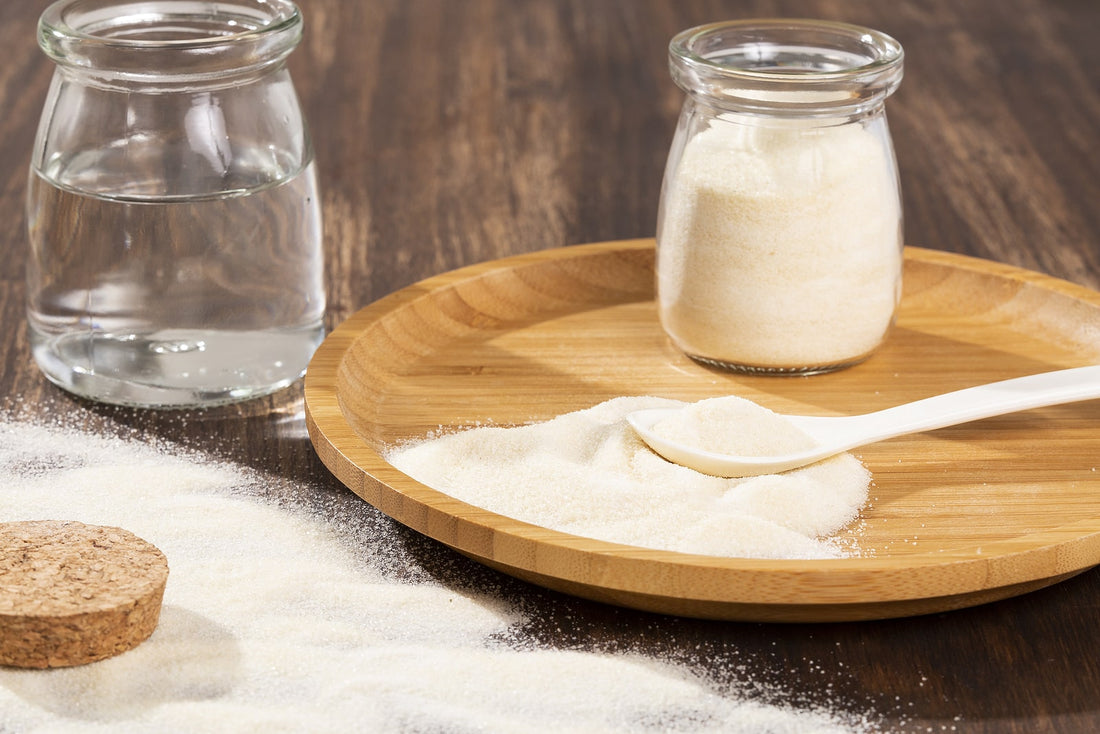Have you had the collagen conversation lately?
You know… the popular product that promises to offer skin, hair and joint health?
And whether you’re an athlete, concerned about wrinkles, or just trying to eat healthier, you’ve probably heard a bit about the different kinds of collagen.
Powders, peptides… hydrolyzed or non-hydrolyzed. What’s the difference, and which type is best for you?
We’ll cover all this and more, so stick around.
Collagen
When you first hear the word “collagen”, what comes to mind? Bones, white powder? Those are fairly common guesses, and there is some truth to that.
Collagen is the most abundant protein in your body. In its purest form, it looks like a triple helix - similar to your DNA. This purest form is considered non-hydrolyzed and is used a lot in scenarios of wound healing (4).
This fascinating triple helix is made by combining three amino acids (1):
- Glycine
- Proline
- Hydroxyproline
Together, these amino acids form the proteins found in all your connective tissues. It’s one of the most important proteins out there, acting like a “glue” that holds everything together.
Over time, however, your body makes less of this vital protein. This can result in joint pain, dry skin, fine lines, wrinkles, and more.
Scientists have discovered nearly 28 different types of collagen (2), but some of the most common types are:
- Collagen type I: This type is most commonly found in bone, teeth, skin, organs, tendons, and ligaments.
- Collagen type III: This collagen type is typically found in your blood vessels, muscle, and skin.
- Collagen type V: Type 5 collagen can be found on the surface of your cells, and in the placenta of women.
- Collagen type VI: This unique blend is found in the skeletal muscle (3).
Because of the important role collagen plays in good health, many wellness companies have set out to create their own versions. Whether you find it as a dietary supplement or topical product, there is something for everyone.
In order for you to benefit, however, the collagen needs to be broken down enough so you can absorb and process it. This leads to what is called hydrolyzed collagen, and is what most supplements on the market are made of.
Hydrolyzed Collagen
What exactly is hydrolyzed collagen? It’s basically what you get after molecules are broken down through a process called hydrolysis (6).
This process makes the protein molecules smaller and more easily absorbed into your bloodstream.
Most supplements you see on the market are hydrolyzed to some degree.
Gelatin vs Collagen Peptides
So if hydrolyzed collagen is better, what about gelatin and collagen peptides?
Collagen peptides are actually the same thing as hydrolyzed collagen. The hydrolyzing makes the collagen helix break up into smaller amino acid chains. These smaller chains are called peptides.
These terms are often used interchangeably, but they’re one in the same.
Gelatin is a bit different, however. While collagen is naturally found in your body, gelatin is a cooked form of collagen. It’s generally extracted from animal skin or bones and cooked down to produce a protein product (7). Unlike collagen peptide powders or liquids, gelatin forms a gel-like substance when mixed with water.
What is the Best Form of Collagen to Take?
If you’ve decided you want to start taking collagen, how do you know which ones are the best for you?
This will depend on your goals, and how well your body responds to certain products. The most popular forms of collagen to choose from are:
- Foods
- Powders
- Capsules or Tablets
- Liquids
- Topical
Food will always be the best first choice. Organ meats and organic bone broth are great ways to naturally meet your collagen needs.
But food isn’t always enough, which is where supplements come in. Thankfully, collagen products are generally safe with little negative side effects (5). That said, if you’re allergic to fish, egg, or bovine, consult with your doctor before adding collagen to your diet.
There is debate on whether topical creams actually work, but researching third-party testing and positive customer reviews is a good place to start.
Summary
Your body is made up of all kinds of proteins. Collagen is one of the most abundant protein in your body, and is an important ingredient in all your bones, organs, and connective tissue.
And when it comes to collagen, there seems to be a lot of options. The collagen your body produces will start out in its purest, non-hydrolyzed form. But in order to process collagen from outside the body, it needs to be broken down, or hydrolyzed.
Foods like bone broth and organ meats are a great source of natural collagen, with supplements following close behind. There are a variety of ways you can take collagen, and it might take some trial-and-error before you find a type that works for you.
The main difference between collagen and hydrolyzed collagen is the molecule size. In its purest form, your body produces a collagen protein helix that is stable on its own. But in order for your body to utilize outside sources of collagen, it needs to be broken down through hydrolysis. This gives you varying degrees of hydrolyzed collagen, which is in nearly every supplement on the market today.
Do you know someone who could use a little more collagen in their life? Share these insights with them today!
References & Disclaimers
1. https://www.ncbi.nlm.nih.gov/books/NBK507709/
2. https://www.ncbi.nlm.nih.gov/pmc/articles/PMC8399689/
3. https://www.sciencedirect.com/topics/medicine-and-dentistry/collagen-type-6
5. https://health.clevelandclinic.org/what-do-collagen-peptides-do/
6. https://www.ncbi.nlm.nih.gov/pmc/articles/PMC6891674/
7. https://www.ncbi.nlm.nih.gov/pmc/articles/PMC5430197/
✝✝This noted statement is based on independent research and is not necessarily the opinion of the author
